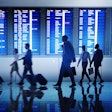[This article originally appeared in the June/July 2006 issue of BizBash magazine.]
Prominent guests tend to bring extra attention to the events they attend—some of it good (publicity, excitement among other guests), some of it not so good (crashers, stalkers, and worse). So dealing with V.I.P.s also often means dealing with security.
What do you need?
Different types of V.I.P.s require—and prefer—different kinds of protection. “Minor celebrities think they need more security than they really do,” warns Micro Target Media vice president Danielle Jennings. “It gives them a sense of power.”
On the other hand, C.E.O.s often like to be very discreet. Barry Meyerson, the owner and founder of New York-based personal and event security firm Meyerson Associates, which has handled events like Ralph Lauren fashion shows and Chelsea Clinton’s birthday party, says that top executives often prefer personal security to blend into the crowd. “They want [security professionals] to appear like a business colleague who can speak with people,” he says, “Not only will they offer an element of surprise against threats, but they are not perceived as a road block for them to meet other guests.”
Note that an event with lots of high-level guests does not necessarily need more security. “If you have the proper security in place, then it doesn’t matter if 18 V.I.P.s are coming with their own security or not, or if it’s Bill Clinton or Bruce Willis,” says Mike Zimet, owner of Mike Zimet Enterprises, a New York-based personal protection and event security firm that handles movie premieres and corporate and diplomatic events. And you don’t want your event to look like an armed camp. “Event security has already created a secure perimeter, so personal security can just be on the edge of the event where they can see the person but won’t upset the look and balance of an event,” Zimet adds.
Where do you start?
Provide your event security team with a complete guest list in advance. “We can then contact the V.I.P.s’ staff directly to find out who has their own security or will require additional security because they have received a lot of publicity lately or a specific threat,” says Chuck Garelick, managing director of GSS Security Services Inc., a New York-based security firm that handles events from Pediatric AIDS Foundation fund-raisers to the Times Square ball drop on New Year’s Eve. “Security for basic movement in a crowd-control situation is different from a threat through fan mail or an identified individual like a stalker.”
If the celebrity is bringing his own security guards, your security staff will check their backgrounds, qualifications, licensing, and insurance, as well as discuss your site’s gun regulations. “We will also work out some kind of ID process so they will be identifiable to us,” Garelick says. If personal security shows up without prior warning, it can create major problems. “They could create a liability because we don’t know anything about them,” Garelick says.
“Sometimes a celebrity may want to bring three, four, five security people,” Zimet says. “They don’t need them all. The place is already secure through us and there is no need to crowd the event with all this security.”
How do you plan ahead?
All security issues and plans for arrival and departure times should be decided prior to an event. “We have a walkthrough in advance, show them the private limo drop off, the staging area for their driver where their car can be kept separate from the other guests, and where they can have a separate entrance and walkway,” says Christina Sion, vice president of food and event services at Los Angeles’ California Science Center. “They want everything away from public access, where they can control it.” Sion also advocates not being the only contact person. “Pros are better served talking to each other, so have your security people talk to their security people and then follow up with them,” she says.
Making an important guest’s personal security aware of your needs is a must, as celebrities only do what their protection tells them. Sion recalls how a walkthrough with then-Vice President Al Gore’s advance team prior to the opening of the science center in 1998 led to him performing a high-wire bike stunt the night of the event. “It never would have happened on the fly if his security hadn’t tested it by throwing themselves into the net 50 feet below again and again,” Sion says.
In addition to securing your event space and vetting staff, remember that event security staff also interacts with guests—sometimes very closely—so prepare them to meet any requests. “Inevitably my client will ask his security where the bathroom is,” Meyerson says. “You have to know in advance because you don’t want to zigzag them around the entire event, and preferably you can get them a private bathroom.”
How does everyone work together?
Not all security is created equal. “Law enforcement, like the state police, U.S. state department, and Secret Service, always takes the lead,” Garelick says.
Meryl Hillsberg, senior event planner, conference and banquet services at UJA-Federation of New York, where she works on fund-raisers and events—often with top political figures or C.E.O.s of major corporations—once had the then-president of Ireland as the keynote speaker at a UJA event. His advance team told her to move the podium three feet to the left so there was no direct line through windows to the president. “You just have to say, ‘No problem,’” Hillsberg says, and make the event as safe as possible.
And working well with security pros—especially a V.I.P.’s own protection—has its rewards. “I’ve found you have to treat security people as if they are your own V.I.P.s,” Hillsberg says. “Go out of your way to be accommodating and friendly, make sure to fill whatever their need is. They are the only ones who can get you the access you need to the V.I.P.”


















